The composition of the sample
Most of the respondents have other jobs in addition to their work as in music. So, the answers reported in this survey come from a poorer and less professional segment of the music community than is often represented in the discussions that have raged around Washington about copyright and downloading.
Here is a summary of basic demographic information about the respondents included in our sample:
Gender
- 74% Men
- 23% Women
Age
- 24% are aged 18-29
- 47% are aged 30-49
- 16% are aged 50-64
- 1% are aged 65 or older
Music occupation
- 53% consider themselves to primarily be songwriters
- 44% consider themselves to primarily be musical performers
Percentage of annual income earned from being a songwriter or musical performer
- 8% earn 100% of their income from their music endeavors
- 8% earn 60%-99% of their income from music
- 12% earn 20%-59% of their income from music
- 41% earn 1%-19% of their income from music
- 25% earn no significant income from their music
About The Pew Internet & American Life Project
The Pew Internet & American Life Project is a non-profit initiative, fully-funded by The Pew Charitable Trusts to explore the impact of the Internet on children, families, communities, health care, schools, the work place, and civic/political life. The Project is non-partisan and does not advocate for any policy outcomes. For more information, please visit our Web site: https://www.pewresearch.org/internet/.
Musician Web Survey (Excerpt)
Topline, 4/23/04
Data for March 15 – April 15, 2004
Princeton Survey Research Associates for the Pew Internet & American Life Project
Sample: n = 2,793 musicians, songwriters and music publishers
Interviewing dates: 03.15.04 – 04.15.04
NOTE: The survey results are based on a non-random online sample of 2,793 musicians, songwriters and music publishers, recruited via email notices sent to members of various music organizations, through announcements on those organizations’ websites that provided a direct link to the survey, and through flyers distributed at several musicians’ conferences. Since the data are based on a non-random sample, a margin of error cannot be computed, and the results are not projectable to the entire population of musicians, songwriters, and music publishers.
Has the Internet … made it harder to protect your music from piracy or unlawful use?

Has free downloading on the Internet increased, decreased, or not really affected…

In general, would you say that free downloading on the Internet has helped your career as a musician, hurt your career, or not really made any difference?

If someone put a digital copy of your music on the Internet without your permission, would this bother you or not?

As far as you know, has someone ever put a digital copy of your music on the Internet without your permission?

Overall, do you think file sharing on the Internet poses a MAJOR threat to creative industries like music and movies, a MINOR threat, or that it poses no real threat at all?

Which of the following statements comes closest to your own opinion, even if neither is exactly right?
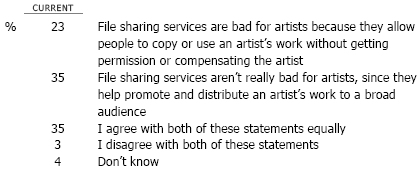
Once a piece of art is produced and copyrighted—whether it is a song, a painting, a quilt or a sculpture–how much control do you think the copyright owner should have over its use?
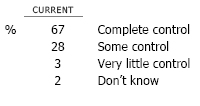
Do you strongly agree, agree, disagree or strongly disagree with each of the following statements about current copyright laws…
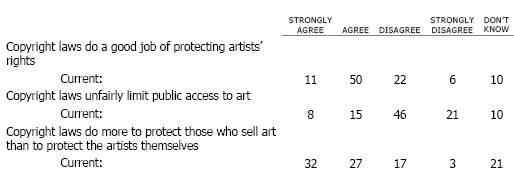
Under current law, the copyright for a piece of art lasts for the artist’s lifetime and then for 70 years more. Once a copyright expires, the work enters the public domain and anyone can use it. Do you think the current length of copyright terms is…?
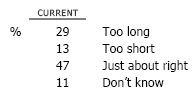
As you may know, the Recording Industry Association of America, RIAA, has begun taking legal action against individuals who are sharing large numbers of music files online without permission from the copyright holder. Who do you think should be held responsible for unlawful file sharing that happens online?
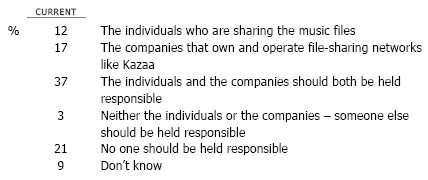
Do you think the RIAA’s recent legal action against individual downloaders will ultimately benefit musicians and songwriters?

Current technology makes it possible to “copy-protect” digital forms of music such as CDs and audio files so that unauthorized copies cannot be made. If you had the choice, would you want your music to be copy-protected so that digital copies could not be made without your permission?

Some people intentionally break or disable the copy protection mechanism on the CDs and DVDs they purchase. Do you think people who do this should be prosecuted for copyright infringement?

Methodology
Musician Web Survey
Prepared by Princeton Survey Research Associates International for the Pew Internet & American Life Project
April 2004
SUMMARY
The Musician Web Survey, sponsored by the Pew Internet & American Life Project, obtained online interviews with a non-random sample of 2,793 musicians, songwriters and music publishers. The interviews were conducted online, via WebSurveyor, from March 15 to April 15, 2004. Details on the design, execution and analysis of the survey are discussed below.
Sample Design/Contact Procedures
Sample was recruited via email invitations to the current membership/subscriber lists of the following music organizations:
- The Future of Music Coalition
- Just Plain Folks
- American Federation of Television and Radio Artists
- CD Baby
- Nashville Songwriters Association
- Garageband.com
- American Society of Composers, Authors and Publishers
- American Federation of Musicians
Altogether, email invitations to participate in the survey were sent to approximately 300,000 members of these various organizations. These invitations provided a direct link to the survey, and contained the following language:
Dear Members,
[ORGANIZATION NAME HERE] has been working in partnership with the Future of Music Coalition, the Pew Internet & American Life Project and an array of other musician-based organizations to design a balanced survey that will give musicians, performers and songwriters a chance to speak up about the Internet, file-sharing, and copyright issues. We all know that new technologies have created many complex challenges as well as many new opportunities for musicians, yet we often hear more about how businesses and consumers are responding to these changes at the expense of understanding how artists think and feel about these issues.Now’s the time to make your voice heard.
We invite you to take about 20 minutes of your time to share your opinions and experiences through this important survey.
Visit http://websurveyor.net/wsb.dll/11719/Music.htm from March 15 – April 15, 2004 to participate.
Your contribution will have a valuable impact, as the findings from this survey will be widely circulated and discussed.
Don’t miss this great opportunity to speak up on behalf of artists!
Sincerely,
[ORGANIZATION REP]In addition to sending email invitations to their members, The Future of Music Coalition, Garageband.com and The American Federation of Television and Radio Artists posted a notice about the survey on their websites that provided a direct link to the survey front page. The Future of Music Coalition also printed flyers announcing the survey, including the URL, and distributed them at several musicians’ conferences held during the survey field period. Both the website postings and the flyers contained the following text:
Musicians, performers, and songwriters: What do you think about peer-to-peer file-sharing and music on the Internet?
How has the Internet impacted the way you create, promote, or distribute your music?
____________________________________________________________________
[ORGANIZATION NAME HERE] has been working in partnership with the Future of Music Coalition, the Pew Internet & American Life Project and an array of other musician-based organizations to design a balanced survey that will give musicians, performers and songwriters a chance to speak up about the Internet, file-sharing, and copyright issues.We’ve all heard speculations about what musicians are “really thinking” in the changing digital landscape. Yet, from our vantage point inside the music community these projections have always seemed too narrow to represent the complex concerns we regularly experience in our discussions with musicians.
It’s time to stop projecting our thoughts and preferences onto musicians and, instead, ask musicians to share their own experiences and opinions.
To that end, CD Baby, Just Plain Folks, Nashville Songwriters Association, AFTRA, and AFM, the Future of Music Coalition and the Pew Internet & American Life Project have designed an online survey that asks musicians a variety of questions about music, technology, copyright, peer-to-peer filesharing, emerging best practices, and the public domain.
We urge musicians, songwriters and performers of all types to take this online survey so we can better understand the complexity of these changes and the diversity of our community.
Visit http://websurveyor.net/wsb.dll/11719/Music.htm from March 15 – April 15, 2004 to participate.
When the survey is complete the results will be published and distributed to those who have a critical stake in the current debate. We hope they will open another channel in the discussions about how music will be enjoyed, and how musicians will be compensated in the future.
About the Future of Music Coalition:
The Future of Music Coalition is a not-for-profit collaboration between members of the music, technology, public policy and intellectual property law communities. The FMC seeks to educate the media, policymakers, and the public about music / technology issues, while also bringing together diverse voices in an effort to come up with creative solutions to some of the challenges in this space. The FMC also aims to identify and promote innovative business models that will help musicians and citizens to benefit from new technologies.
About the Pew Internet & American Life Project:
The Pew Internet Project is a nonprofit, non-partisan think tank that explores the impact of the Internet on children, families, communities, the work place, schools, health care, and civic/political life. The project aims to be an authoritative source for timely information on the Internet’s growth and societal impact. Support for the project is provided by The Pew Charitable Trusts. The project’s Web site: www.pewresearch.org/internet.
Completion Rate
Based on figures supplied by WebSurveyor, PSRAI has calculated the following completion rate for the Musician Survey:
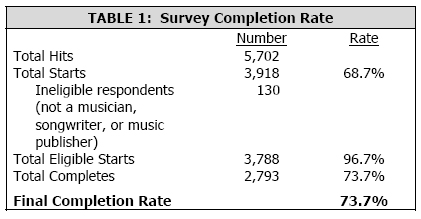
In Table 1, total hits (5,702) indicate the number of times the survey link was accessed, or roughly the number of potential respondents who reached the survey’s title page, though no control was in place to prevent someone from accessing the link more than one time. The link took people to the survey title page, which gave the following brief description of the survey and its sponsors, along with instructions for how to complete the survey:
Welcome to the Pew Internet & American Life Project’s musician survey. The goal of this survey is to measure the impact of the Internet on songwriters and musical performers. Thanks so much for taking the time to help us better understand how the Internet affects your music, as well as how you communicate with other artists, artists’ organizations, and fans.
Our survey will take most respondents about 20 minutes to complete, though it may be longer or shorter for some people. Most questions give you response categories from which to choose. Others are followed by a blank text area where you can write your answers. The text areas will hold up to 300 words, so feel free to make your answers as long as you like. You must provide an answer to each question in order to move to the next; once you answer a question and move on, you will not be able to return to that question to change your answer.
Please complete the survey only once.
If you have questions about the survey, or if you’d like to send us additional input later, we’d be glad to hear from you at Music@pewresearch.org/internet.
CONFIDENTIALITY NOTICE
As with all studies we conduct with our survey research firm, Princeton Survey Research Associates International, all of your answers are completely confidential. Responses are analyzed only in the aggregate, and are never linked to the individual completing the survey. No identifying information is required to complete this survey, other than basic demographic characteristics.
If you have any questions about this survey, or concerns about confidentiality, please feel free to contact MusicSurvey@psra.com or the Pew Internet & American Life Project at Music@pewresearch.org/internet.
Go to https://www.pewresearch.org/internet for more about the Pew Internet & American Life Project, or go to http://www.psra.com for more about Princeton Survey Research Associates International.
Total starts (3,918) indicate the number of people who, upon reading the title page, clicked the “next” button to self-select into the survey. Based on screening questions in the survey, 130 of these respondents were deemed ineligible because they were not part of the target population of musicians, songwriters or music publishers, and thus were removed from the final sample. That left 3,788 total eligible starts. Total completes (2,793) indicate the number of eligible respondents who completed the survey. The final completion rate for the survey is computed as the number of eligible completes (2,793)/the number of eligible starts (3,788), or 74%.
Questionnaire Development
The questionnaire was developed by PSRAI in collaboration with staff of the Pew Internet & American Life Project and their partners in the music industry. Many questions were originally asked in Pew Internet RDD telephone interviews with previous samples of adults age 18 and older and self-identified artists. Where appropriate, questions were modified to focus on music only (as opposed to artistic work in general), and to reflect the principles of online survey design which varies in some ways from telephone survey design.


